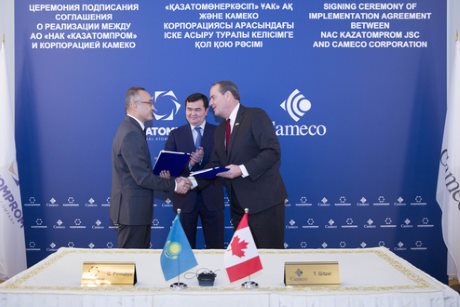A restructuring of the Inkai joint venture (JV Inkai) between Cameco and KazAtomProm has closed and will take effect on 1 January, the companies announced yesterday. The restructuring will see KazAtomProm increase its share in the joint venture, which owns and operates the Inkai in-situ leach uranium project in southern Kazakhstan, to 60%.
 |
| Pirmatov (on the left) and Gitzel (right) signed the documents on the restructure at a ceremony in London (Image: KazAtomProm) |
The restructuring, announced in May 2016, has now obtained all required government approvals, including an amendment to JV Inkai's existing Resource Use Contract with the Kazakh government. The amendment gives JV Inkai the right to increase production to 10.4 million pounds U3O8 (4000 tU) per year, from the currently licensed 5.2 million pounds. It also allows JV Inkai to produce from blocks 1, 2 and 3 to 2045: current lease terms are to 2024 for block 1 and 2030 for blocks 2 and 3. The current boundaries of the blocks are also adjusted to match the production profile agreed for JV Inkai to 2045.
Cameco's interest in JV Inkai, currently 60%, will reduce to 40% from 1 January, when a new governance framework for the joint venture protecting the rights of Cameco as a minority owner will come into effect.
"This agreement is positive for Cameco as it secures our access to a large, low-cost production source through 2045," Tim Gitzel, Cameco president and CEO, said. Production decisions would depend on market conditions and the terms of the Resource Use Contract, he added.
KazAtomProm CEO Galymzhan Pirmatov said the two companies had enjoyed a successful working relationship for many years.
"I am confident that the agreement between our companies will give new impetus to Kazakh-Canadian cooperation in the nuclear sphere. Increasing our participation share in Inkai will allow us to further develop this key asset together," he said.
The amendment to the Resource Use Contract and the ownership adjustment results in material changes to Cameco's mineral reserves and resources for Inkai, the company said. Cameco's share of Inkai's total 269.6 million pounds of proven and probable reserves as of 1 January will be 107.9 million pounds, reflecting its 40% share. Cameco's current interest in production from JV Inkai is 57.5% based on previous agreements with KazAtomProm.
Compared to mineral reserves reported as of 31 December 2016, Cameco's share of JV Inkai mineral reserves increases by about 62 million pounds, the company said. Measured and indicated mineral resources decrease by nearly 68 million pounds and inferred mineral resources decrease by nearly 56 million pounds. Cameco will detail the changes in a new NI 43-101 technical report for JV Inkai to be filed within 45 days.
The two companies have also completed a feasibility study to evaluate the design, construction and operation of a uranium refinery in Kazakhstan with the capacity to produce 6000 tU annually as uranium trioxide. A formal joint decision has not yet been made as to whether the refinery will be built, they said. In the event of a joint decision to construct the refinery, further adjustments to Cameco and KazAtomProm's ownership interests in JV Inkai will be made.
Cameco and KazAtomProm - the world's top two uranium producers, between them accounting for 39% of world production in 2015 - have recently announced plans to cut output.
KazAtomProm announced on 4 December that it will reduce planned uranium production by 20% for a period of three years beginning in January, to better align output with demand. Cameco on 8 November announcement of a ten-month temporary suspension of production from the McArthur River mining and Key Lake milling operations in northern Saskatchewan by the end of January due to continued uranium price weakness.
Researched and written
by World Nuclear News




_23009.jpg)
_33392.jpg)
_53504.jpg)







